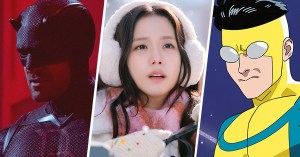Explosive Loki Finale Reveals the Answer and Uncovers More Questions About the Multiverse (of Madness Most Likely)
Tom Hiddleston and Sophia Di Martino's Lokis confront the future and the past and each other and another guy.

(Photo by Marvel Studios)
Who would’ve ever thought an exposition dump could be so entertaining? Loki’s finale offered up one of the most astonishing talk-filled reveals yet. And that’s considering the answers are still cosmic in nature and obscured ever so slightly by long-range Marvel Studios set-ups. Nevertheless, a welcome guest star navigated that tightrope with aplomb.
At the same time, character beats continue (to some extent, anyway) and a new set of problems beset the former God of Mischief (Tom Hiddleston). So let’s take a look at what he learned, what occurred after he learned it, and what problems the answer to the series’ central mystery holds for the Marvel Cinematic Universe at large.
Spoiler Alert: The following reveals details of the finale episode of Loki season 1. Stop here if you have not watched “For All Time. Always.” Speculation includes information from Marvel comic books and may also be considered spoilers to some.
The Answer Is: He Who Remains

(Photo by Marvel Studios)
So, as it turns out, our list of suspects from last week proved to be correct in two cases. He Who Remains set the TVA in motion, but it was not Mobius M. Mobius (Owen Wilson). Instead, the person remaining is a 31st century scientist we know to be Nathaniel Richards (Jonathan Majors) — even if he never uses that name here — or better known across the internet the last six weeks as Kang the Conqueror.
But is He Who Remains really Kang?
For the moment, we’ll take He Who Remains at his word. He is a more benevolent Nathaniel who took part in the Multiversal War against variants of himself from other realities and discovered the only way to end the chaos was to eliminate free will — including his own. Perhaps not as mind-bendingly strange as the He Who Remains of the comics (perhaps Marvel is saving the notion of a survivor from a previous universe for Galactus), but still a pretty heady concept for those less familiar with the Big Cosmic Ideas 1970s superhero comics, philosophy texts, or really out there sci-fi novels.
Also, we’ll point out, the origin of the Multiversal War he describes to Loki and Sylvie (Sophia Di Martino) sure sounds like the origin of the Multiverse over at the crosstown rival. In the DC Universe, a scientist named Krona unleashed multiversal energy by using a time viewer to witness the birth of the universe, altering the fabric of reality forever.
In He Who Remains’ case, though, the Crisis on Infinite Earths was a crisis of ego as the variant Nathaniel Richardses fought to dominate the Marvel Multiverse. It suggests Kang, when we meet him in Ant-Man and the Wasp: Quantumania, will be distinct from He Who Remains. It also suggests Majors may end up playing several different versions on Nathaniel Richards during his time in the MCU. As He Who Remains mentions, the character (and his variants) goes by many names, including Rama-Tut, Kang the Conqueror, Immortus, Blue Totem, Victor Timely, Scarlet Centurion, and more. Also, as he shares a name with Reed Richards’s father, there is always the possibility he will turn out to be his own ancestor.
Then again, considering he presents himself to two Loki variants, can we take anything he said at face value? It is possible he is, indeed, the Nathaniel Richards who became Kang. Allowing the Lokis to proceed this far could be part of his plan to continue dominating reality. Or he’s the one who became Immortus and this is part of a gambit to ultimately preserve his preferred timeline.
As we also mentioned last week, it is possible for some viewers to see the Kang reveal as anticlimactic. He is not an established character in the context of the series — despite the relentless hinting — and the answer actually moves things away from Loki. We think that sensation would be far worse if the show was a limited series like WandaVision and The Falcon and the Winter Soldier, but now that season 2 is a definite thing, his debut has more of a season 1 finale flavor than it might have otherwise had, especially considering the last image before the credits.
Where Is Judge Renslayer?

(Photo by Marvel Studios)
As we move into a Marvel Multiverse of variants, we’re going to refer to the Ravonna Renslayer (Gugu Mbatha-Raw) we’ve seen up until now as “Judge Renslayer.” Much like Nathaniel Richards, naming her variants is going to be important in order to keep things orderly.
As we saw in the episode, Judge Renslayer seemingly escaped the coming calamity by leaving the TVA. Her stated motivation was to search for free will, but it is easy to interpret that as following order from He Who Remains. What file did Miss Minutes (Tara Strong) serve up to Judge Renslayer? Was it enough to make her question the TVA’s stated purpose entirely or did it strengthen her resolve? Her conversation with Mobius suggests the latter, but considering how long the judge has kept her motivation close to her vest, anything is possible.
Meanwhile, it is interesting to note that on He Who Remains’ preferred timeline, Ravonna Renslayer is the principal at Roosevelt High in 2018. As we’re mentioned before, her comic book counterpart was a princess from the 40th century Kang tried his best to woo. She died admitting her affection for him and a variant of Kang went in search of a way to rescue her — leading to further variants of both characters. But if the Ravonna of the MCU is a 21st century Earth woman, will it lead to her meeting Kang under very different circumstances?
Also, what sort of trouble could a high school principal get up to that a variant of her would end up near the top of the TVA’s command structure? A puzzle for Quantumania to answer, perhaps?
Or maybe the point of divergence is the very thing Judge Renslayer went to investigate. Determining why she was plucked away from the timeline may offer some clarity. Then again, that clarity all depends on whether or not she still follows He Who Remains.
“We’re All Villains Here”

(Photo by Chuck Zlotnick/Marvel Studios)
The central question of free will also plays out among the Lokis as Sylvie, seemingly, gives into her nature. At least, that’s the way the show is framing it for the moment. Beyond confirming her bond with Loki is romantic — which, truth be told, we’re not fond of — her actions here prove she is steadfast in her mission: kill the power behind the TVA.
Following through on that suggests she has not grown over the course of the adventure. Instead of the expanded awareness Loki seems to have gained, she remained a prisoner of her predetermined role by killing He Who Remains. And, to be honest, that’s a downer. Sylvie proved to be such a wonderful addition to the Marvel mix that we hate to see her ultimately fail (in more personal terms, anyway). We always expected one more betrayal before the season ended, but we never thought it would be her. Until it is resolved next season, it stands as something of a disappointment as it seems contrary to where the character was headed.

(Photo by Marvel Studios)
And, to be fair, the show also cast doubt on Loki’s seeming empathy toward the timeline and the countless lives within it. He could still be trapped in his nature and thinking of the throne — he is still a Loki, after all. It is enough of a doubt to fuel the fight between Loki and Sylvie in terms of the narrative. Nevertheless, we are inclined to believe Loki has changed and his concerns have grown beyond his own immediate desires. The proof: He cares enough about Sylvie to want her to grow beyond vengeance.
The show is called Loki, after all, his character development has to be paramount.
It is interesting to note that He Who Remains tempts them twice: once with what they wanted before being trimmed from the timeline and then again with control of the Sacred Timeline itself. In the second case, he even frames it by reminding them (and us) that they are all villains. If nothing else, it sets up a new conflict for the second season as Loki and Sylvie will have to determine who the villain really is in this situation.
Well, presuming Sylvie even remains at the Citadel at the End of Time. The Multiverse is open to her now and she could try to go home at long last.
Or was this her supervillain origin all along?
The Multiverse of Possibilities

(Photo by © Columbia Pictures / © Marvel / courtesy Everett Collection)
One odd thing to consider about Sylvie’s killing blow: it means the Sacred Timeline has been undone back to its root. There has always been a Mutliverse now and it contains things like the Sony Spider-Man films, Agents of S.H.I.E.L.D.’s later seasons, and whole wealth of possibilities. Some of which will likely be explored next month when What If…? starts its run.
But as the final scene suggests, the change will only be perceptible to Loki, Sylvie, and potentially, Judge Renslayer. Note how Hunter B-15 (Wunmi Mosaku) and Mobius fail to recognize Loki. The TVA has been utterly changed at its core — now owing its existence to either Kang or Immortus. From their point of view, Loki never arrived at the TVA for judgement and the TVA is operating more or less as it always has.
At least, that’s one possibility.
The other: Kang’s (or Immortus’s) TVA employs more than one variant B-15 and Mobius in its ranks. The ones Loki knows are still up in the control room watching the timeline unravel.
Either way, Loki is the only one who can perceive the fundamental shift in things at this point. And we’re not just talking about Loki as a series. Out in the wider MCU (and Phase 4), no one is aware of the Multiversal War, Nathaniel Richards, or the existence of variants. Wanda (Elizabeth Olsen) is still reading The Darkhold. Sam Wilson (Anthony Mackie) is still getting used to being Captain America, and Natasha Romanoff (Scarlett Johansson) is still dead. It will be interesting to see if Shang-Chi and the Legend of the Ten Rings or Eternals make any reference to the Multiverse in the coming months.

(Photo by Marvel Studios)
Granted, there’s a definite point at which the events of Loki will come to light for a different set of characters: Doctor Strange in the Multiverse of Madness. And if the rumors about Spider-Man: No Way Home are true, Peter Parker (Tom Holland) may be the first to really experience what the death of He Who Remains means down at a street level.
Which is the challenge for Marvel Studios going forward: making the timey-wimey happenings of Loki compatible with more straight-forward things like Secret Invasion or Hawkeye. Then again, one of the advantages of the studio’s storytelling technique is that it can set up ideas like these and let them simmer for a project or four.
Also, there is an interesting conflict buried under all of this: How can Loki stop Kang and still retain the possibility of free will? As we’ve said all along, the problem of free will is unique for the MCU because the characters are, ultimately, beholden to the whims of studio president Kevin Feige. In a very real way, they are incapable of choice. As presented within the context of the story, Nathaniel Richards’ war is the ultimate result of free will and the Sacred Timeline is the best way to minimize suffering on a multiversal scale. But is becoming a prisoner to his nature the only workable solution?
Maybe it won’t be Loki’s conflict to resolve in the end. Perhaps the only way to stop a Richards is with another Richards — one a bit more, well, fantastic.
Loki season 2 is now available to stream in its entirety on Disney+.







